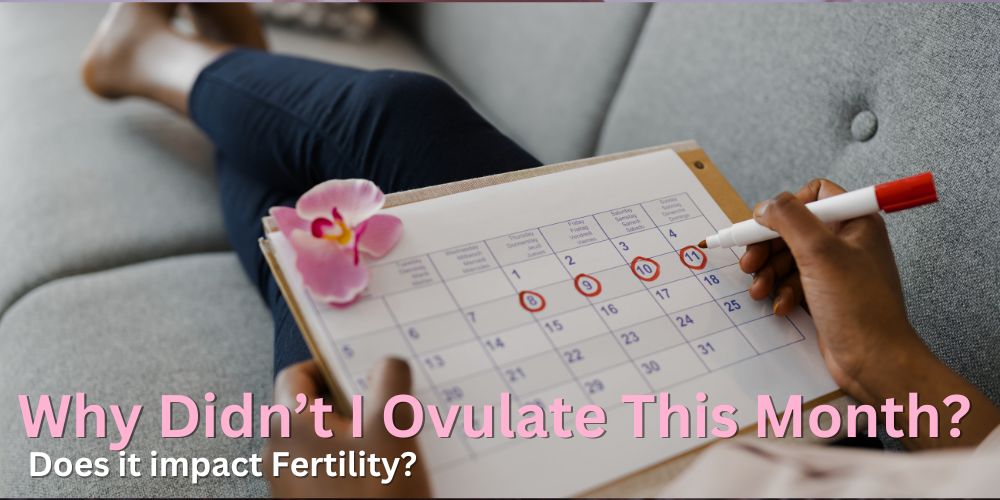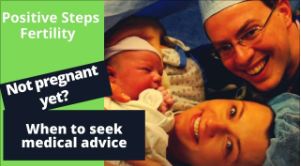Ovulation, or the process in which an egg is released from a woman’s ovary, is essential to fertility. The intricacies of ovulation might be overwhelming for women who might be struggling with ovulating regularly or at all.
Let’s answer the top five questions about anovulation and learn how modern fertility treatments can assist women in overcoming the challenges of anovulation.
1. What happens if you don’t ovulate?
Ovulation is simply the ovary’s release of an egg, but what happens if there is a failure to ovulate? What happens if the egg is not released? It is called Anovulation.
Anovulation is simply when a woman skips ovulation. This can be a chronic condition, or a rare occurrence depending on your circumstances. Anovulation is almost always linked to irregular or skipped menstruation cycles.
While an occasional anovulatory cycle is normal and does not necessarily suggest a serious issue, frequent anovulation could indicate underlying health problems and may impact fertility. In fact, ovulation disorders are some of the most common causes of female infertility.
It’s important to stress that experiencing anovulation does not necessarily equate to infertility. While anovulation is a common cause of infertility, it’s not an insurmountable obstacle. Many causes of anovulation are treatable, and with appropriate interventions, it’s often possible for women who have previously experienced anovulation to conceive.
If you are trying to conceive and begin noticing irregular periods or other signs of anovulation, it’s important to reach out to a fertility specialist to gain a better understanding of your reproductive health.
2. What are the signs and symptoms of not ovulating?
Several indicators might point to anovulation. Some of these include:
- Irregular or absent periods: Women who are not ovulating usually have irregular cycles, which can include light periods with very little bleeding or heavy ones with unusually heavy flow. A short cycle (meaning there are fewer than 21 days between your periods) or a long cycle (there are more than 35 days between periods) can also point to ovulation problems. Some women may not have periods at all, which is called amenorrhea.
- Negative ovulation tests: Ovulation tests measure the level of luteinizing hormone (LH) in your urine, which surges before ovulation. If you never get a positive result on an ovulation test, it may mean that you are not ovulating or that your LH surge is very low or short.
- No changes in basal body temperature (BBT) or cervical mucus: Your body temperature and cervical mucus change throughout your cycle in response to hormonal fluctuations. Before ovulation, your BBT is usually lower and your cervical mucus is clear, stretchy, and slippery, like raw egg white. After ovulation, your BBT rises and your cervical mucus becomes thicker and less abundant. If you do not see these changes in your cycle, it may indicate that you are not ovulating.
- Reduced premenstrual symptoms: Some women experience symptoms such as breast tenderness, bloating, mood swings, or headaches before their period. These symptoms are caused by the rise and fall of progesterone, a hormone that is produced after ovulation. If you do not have these symptoms or they are very mild, it may mean that you are not producing enough progesterone due to anovulation.
3. What causes ovulation disorders?
What if you don’t ovulate? What’s causing that anovulation?
Anovulation can stem from a myriad of factors. Each woman’s body is unique, and the specific cause can vary widely. Firstly, it’s important to know that even in healthy women, the occasional anovulatory cycle can occur without any discernible reason. This irregularity is a normal variation in the menstrual cycle and might not point toward a serious issue.
That said, here are some common causes of anovulation:
Hormonal Imbalances
Hormones act as the conductors of the menstrual cycle orchestra. Any disruption in the hormonal balance can interrupt this symphony and lead to anovulation. Various conditions, such as thyroid disorders, Polycystic Ovary Syndrome (PCOS), and hyperprolactinemia (elevated prolactin levels), can cause this imbalance.
PCOS, in particular, is a common condition that can lead to anovulation. It’s characterized by insulin resistance, hormonal imbalances, and cystic ovaries. Women with PCOS often struggle with irregular menstrual cycles and may find it challenging to conceive due to irregular ovulation.
Age and Ovarian Reserve
As women approach their late 30s and early 40s, the quantity and quality of eggs in the ovaries begin to diminish. According to the American College of Obstetricians and Gynecologists (ACOG), on average a woman will have around 25,000 oocytes (ovarian cells that are necessary for reproduction) by age 37. To put that in perspective, during puberty a woman has around 300,000–500,000 oocytes.
This decrease with age can lead to more frequent anovulation as fewer viable eggs are available for maturation and release. This natural decline in fertility with age is also accompanied by a higher risk of miscarriage and chromosomal abnormalities in the fetus.
Lifestyle Factors
It’s no surprise that how you treat your body affects your fertility.
Certain lifestyle factors can significantly impact hormonal balance and, consequently, ovulation. High levels of stress, extreme weight loss or gain, excessive exercise, and significantly low body weight can all contribute to anovulation.
Even the use of certain substances, such as tobacco and alcohol, can interfere with regular ovulation. The FDA touts research that found that smoking cigarettes reduces fertility overall and negatively affects hormonal balance.
Medical Conditions and Medications
Various health conditions like obesity, eating disorders, premature ovarian failure, or certain systemic diseases can also result in anovulation.
Additionally, specific medications, particularly hormonal contraceptives can suppress ovulation while they are being taken. However, ovulation typically resumes after discontinuation of these medications.
Once again, talking with a fertility specialist about your medical history and current medications is highly recommended to gain a better understanding of your fertility journey.
4. What are the different types of ovulation disorders?
Anovulation is a broad spectrum. There are several types of ovulation disorders, and having a basic understanding of them helps identify and treat particular cases of infertility. The World Health Organization (WHO) has classified ovulation disorders into three main categories:
- Type I ovulation disorders(hypogonadotropic hypogonadal anovulation) occur when the hypothalamus and pituitary gland do not work properly. These are the parts of your brain that control your hormones. This can lead to conditions such as hypothalamic amenorrhea (absence of periods due to stress, weight loss, or exercise) and hypogonadotropic hypogonadism (low levels of sex hormones due to genetic or acquired causes).
- Type II ovulation disorders(normogonadotropic normoestrogenic anovulation) include women with polycystic ovary syndrome (PCOS). PCOS is a hormonal imbalance that causes irregular periods, excess hair growth, acne, and obesity. Women with PCOS may produce normal amounts of gonadotropins (hormones that stimulate the ovaries) and estrogen (female sex hormones). However, their follicle-stimulating hormone (FSH) levels are too low during the first part of their menstrual cycle. This prevents the development and release of a mature egg. Some women with PCOS may ovulate occasionally, especially those who have less frequent periods.
- Type III ovulation disorders(hypergonadotropic hypoestrogenic anovulation) affect women who have premature ovarian failure (POF) or ovarian resistance. POF means that your ovaries stop working before the age of 40. This can be due to genetic factors, autoimmune diseases, chemotherapy, radiation, or surgery. Ovarian resistance means that your ovaries do not respond to the signals from your brain. This can be caused by mutations in certain genes or antibodies that block the action of FSH. Women with type III ovulation disorders have high levels of gonadotropins and low levels of estrogen. They do not have any eggs in their ovaries or very few.
5. How can I manage anovulation?
If you suspect anovulation, the first step is to seek advice from a healthcare professional or a fertility specialist. We may sound like a broken record, but this step is crucial in determining your specific circumstances.
Here are some potential strategies to manage anovulation:
Lifestyle Modifications
Simple lifestyle changes might help regulate ovulation. Maintaining a healthy weight, adopting a balanced diet, engaging in regular moderate exercise, and managing stress are all beneficial steps. These changes are especially effective in managing anovulation due to PCOS.
Medical Interventions
If lifestyle changes aren’t sufficient, medical interventions may come into play. This can include hormonal medications to stimulate ovulation, such as Clomiphene Citrate (Clomid) or Letrozole (Femara). These medications work by stimulating the pituitary gland to produce more follicle-stimulating hormone (FSH), which in turn leads to the growth and maturation of more follicles in the ovaries.
In cases where anovulation is due to other hormonal conditions like thyroid disorders or hyperprolactinemia, treating the underlying condition can often restore ovulation. For instance, if an underactive thyroid is causing anovulation, medication to increase thyroid hormone levels might be prescribed. On the other hand, if high prolactin levels are causing anovulation, medications to lower these levels may be needed.
Assisted Reproductive Technologies (ART)
In some cases, when ovulation cannot be restored or if there are other fertility issues present, Assisted Reproductive Technologies (ART) such as in vitro fertilization (IVF) or Intracytoplasmic Sperm Injection (ICSI) can be used to achieve pregnancy. These technologies can bypass the need for natural ovulation by retrieving eggs directly from the ovaries and fertilizing them in a laboratory.
Anovulation is not insurmountable. With the help of fertility specialists and managing your health, you can overcome ovulation challenges and get on with your fertility journey.
If you are experiencing trouble ovulating, reach out to a specialist today. Don’t suffer in silence. Find answers. Find peace.




